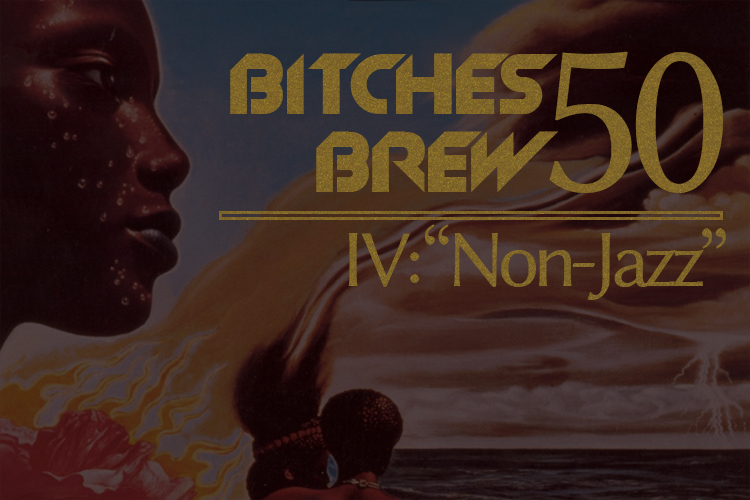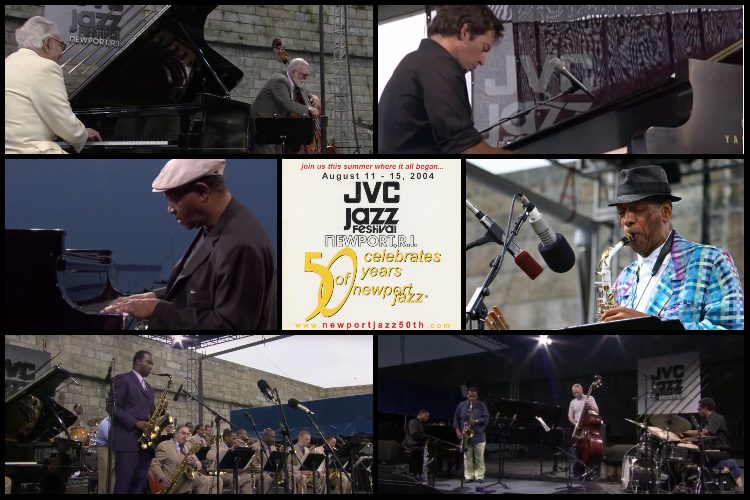Miles Davis’ Bitches Brew 50th Anniversary Celebration- Part Four: “Non-Jazz”
|
Getting your Trinity Audio player ready...
|
This is the final segment of our four-part series celebrating the legacy of the landmark Bitches Brew on its Fiftieth Anniversary. Our prior pieces emphasized the album’s compositions, production techniques, and recent “jazz” albums it influenced. Each adopts the list format and follows two general guidelines: that the artist presented still performs today, and that they never collaborated with Miles Davis. The latter of these limitations is not to minimize the brilliant continued contributions of his bandmates – Wayne Shorter, Bennie Maupin, Chick Corea, John McLaughlin, Dave Holland, Lenny White, Jack Dejohnette, Billy Cobham, Harvey Brooks, and Airto Moreira – but rather to emphasize the recording’s impact outside of his direct sphere of influence.
This chapter examines “non-jazz” albums released since the year 2000 which have been inspired by Brew. While we at Postgenre do not enjoy applying labels to art, we do so solely to assist those who do rely on such categorizations. In this case, none of the five works showcased are likely to be labeled as “jazz” by any listener. In his work, Miles often transcended genres, even becoming one of the few brass players in the Rock and Roll Hall of Fame. Indeed, if anything, his work shows the overall futility of forcing art to fit narrow categories and labels. As such, it should be no surprise that his followers appear all over the musical spectrum. In addition to those showcased here and on our other lists, a wide range of additional artists and groups including Gov’t Mule, Henry Rollins, Phish, Phil Lesh, Chon, Pavement’s Stephen Malkmus, and Metallica’s Robert Trujillo cite Brew as an influence. In many ways, it is fitting that of our four parts, this one is published on the golden anniversary date of the album’s initial release.
Acid Mothers Temple & the Melting Paraiso U.F.O. – Son of a Bitches Brew (Important Music, 2012)
In case the album’s title did not already make it sufficiently clear, this work was significantly inspired by Miles’ original. Even the cover art is similar and, additionally, most of the songs also take their titles from modified versions of the trumpeter’s tunes. The Japanese group employs all types of sonic generators – nei, pungi, electronics, fuzz-otamaton, tape machine, yanquin, space whisper, and tabla – to produce something that aims to be a successor to the original. One of the more interesting facets of the release is that the band decided to completely eschew the use of any computers or hard disk recorders throughout both its recording session or in its mixing. As a result, akin to Brew, any unusual effects are the result of adopting older technologies. The band consists of Shimura Koki, Cotton Casino on space whisper, Tabla Man on Tabla, Higashi Hiroshi on synthesizer, Stoo Odom on vocals, and Tsuyama Atushi and Kawabata Makoto each on numerous instruments.
Tortoise- TNT (Thrill Jockey, 1998)
While Tortoise’s collaborations with the Chicago Underground Orchestra under the name Isotope 217 more readily display Miles’ influence at a surface level, it nevertheless permeates through TNT. Brew’s shadow is particularly apparent in the first two songs – the title track and “Swung from the Gutters”- which both mix the electric and acoustic into a cohesive whole that sounds paradoxically foreign and familiar. Similar to how Miles created a “post-jazz” concept, Tortoise creates what they call “post-rock” by borrowing from a wide range of styles including afrobeat, minimalism, avant-garde, electronica, krautrock, and dub. Their approach is so eclectic that the musicians refuse to be identified by their instrument on the liner notes. Instead, Dan Bitney, David Pajo, Douglas McCombs, Jeff Parker, John Herndon, and John McEntire simply go by “performer.”
Flaming Lips – Embryonic (Warner Brothers, 2009)
The Oklahoma band’s first double-album, Embryonic is highly experimental, drawing from ’60s and ‘70s psychedelic rock and noise. Like Brew, it originated from a search for unheard sounds which was recorded and later re-edited and mixed to present a fresh perspective. As leader Wayne Coyne recalled regarding the sessions “We’d do these jams for Embryonic that would go on for 20-minutes and you could grab a couple of bits out here and there. Cut out the other stuff. Even Miles Davis would do that and put stuff together. And it’s not about saying how it is a performance. Because to me it’s neither. We’re just making a sound. We’re not capturing something. We’re finding something. It’s just something that we play.” “Aquarius Sabotage” particularly captures this approach. It starts with the ferocity of many of Brew’s pieces before transitioning into a more serene sound reminiscent of “Sanctuary.” Here is an interview by Milesdavis.com with Coyne discussing Bitches Brew.
Joining him are multi-instrumentalists Steven Drozd, Michael Ivins, and Kliph Scurlock.
Jim James – Eternally Even (ATO Capitol, 2016)
The My Morning Jacket frontman’s second solo album fuses alternative rock, psychedelia, funk, and R&B into a unique form. Additionally, some jazz sentiments sprinkled throughout, including a synthesized Harmon-muted trumpet sound on “In the Moment.” The blurring of forms in itself evokes Brew as does the fact it sometimes seems to sonically transport the listener to another planet. Like Miles, James pushes the boundaries of music to create a new art form. He is joined by Rob Moose on strings and vocalist Shungudzo Kuyimba. Chris “Daddy” Dave, a name familiar to a large number of “jazz” fans, performs on drums alongside Brian Reitzell. There are also guest appearances by Jim Keltner and legendary saxophonist Charlie Gabriel of the Preservation Hall Jazz Band.
While not from an album per se, My Morning Jacket’s “Octoplasm” likewise hints at the sounds of Brew.
Radiohead – OK Computer (Parlophone/Capitol, 1997)
Regularly hailed as one of the finest albums of all time, an entire chapter could be written solely on the inspiration OK Computer draws from Brew. Leader Thom Yorke has consistently cited its origins in Brew’s “incredibly dense and terrifying sound.”As he told Q magazine “‘Subterranean Homesick Alien’ was born out of listening to [Brew] endlessly every time I drove my car…The first time I heard it I thought it was the most nauseating chaos. I felt sick listening to it. Then gradually something incredibly brutal about it and incredibly beautiful… you’re never quite sure where you are in it, it seems to be swimming around you. It has that sound of a huge empty space, like a cathedral. It wasn’t jazz and it didn’t sound like rock’n’roll. It was building something up and watching it fall apart, that’s the beauty of it. It was at the core of what we were trying to do with OK Computer.”
However, Yorke is far from the only member of Radiohead guided by the groundbreaking 1970 recording. As guitarist Jonny Greenwood has expressed “[w]e love all the atmosphere and chaos on Bitches Brew-the fat, dirty sound of two electric pianos and the [multiple] drummers… That’s why Bitches Brew is so good, beyond just Miles’ trumpet playing. We love how he got together that sense of chaos.”
From a musical standpoint, their admiration is obvious in both the taping together of seemingly disparate portions to form “Paranoid Android” and the background atmospherics of “Subterranean Homesick Alien.”
The preceding, and artists featured on our prior three lists, are just a few of the countless artists who were inspired by Brew. Infinitely more have been indirectly and yet further musicians will be over the next fifty years. A special vinyl reissue of the masterwork is available at MilesDavis.com.
Postgenre would like to issue a sincere and heartfelt thank you to Vince Wilburn Jr. of Miles Davis Properties LLC for his assistance with this project and for his and Erin Davis’ fine work to continue to keep Miles’ artistic legacy alive. Additional thanks to Karen Sundell of Rogers and Cowan, Zach Hochkeppel of Sony Music, and Bruce Lampcov of Downtown Music Holdings.




You have done such a beautiful job commemorating Miles Davis’ work and exemplifying the profound impact he has had on other musicians spanning decades. My heart is filled with joy and pride as I read and listen. Although it took several months it was well worth the wait.